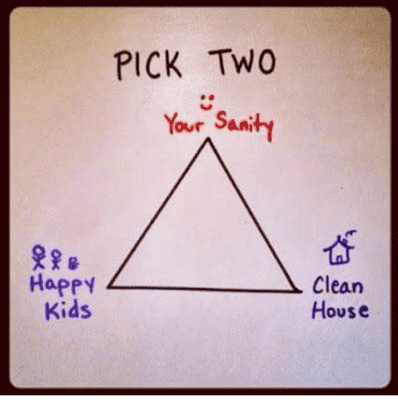First disclaimer, I am one person. I’m a parent, and I’m a provider.

[Image Description: An image of a black, drawn triangle. At the top of the image are the words “PICK TWO” in all caps. On top of the triangle are the words “your sanity” in red with a smiley face above them. On the bottom right of the triangle are the words “clean house” in blue with a small house above them. On the bottom left are the words “happy kids” in blue with 3 stick figures of people above them.]
But I can only share my own personal experience. I appreciate that we all have different experiences. Maybe my story will resonate with you, maybe it won’t. Either way, hopefully it will give you an opportunity to reflect on how you’re doing; what is working for you and what compelled you to click on this topic? Second disclaimer, whenever anyone gives you advice, it will likely be simplified and sound easy to implement. Navigating life, especially life with a disability, is not simple or easy. Take the advice and make it your own. It’s only good advice if for you if it is meaningful to you.
When my kids were small and I was feeling bogged down, a friend sent me this:
![[Image Description: An image of an orange triangle, square, and pentagon arranged horizontally.]](/wp-content/uploads/2023/03/Image-of-a-triangle-square-and-a-pentagon.jpg)
I remember it clearly not because it was an absolute truth, but because it felt like I had been given permission to let something go. There were days that I gave my kids too much screentime because I needed to clean up for my own peace of mind. Keeping this triangular visual in mind helped me to remember that I was not a terrible mother for doing so. There were other times where the laundry was overflowing (ok, regularly), but my kids needed me and and that was enough. Our kids demand more or less of us at different times; sometimes it’s physical, sometimes emotional, sometimes both. No matter how capable, driven or passionate we are, we are also human and it’s ok not to do everything all the time.Today, given my own life circumstance, my triangle looks different, but I reference it regularly when I start to feel overwhelmed. It helps me understand that when the “home” part of me feels like I’m not keeping up, it could be because my role as “student” or my work for my job is particularly demanding. How do you define your most demanding roles? If you had to think of all the balls you have to keep in the air on a given day, can you put them in three categories? …or maybe it’s four, or five!
Now think of a time where one of those categories needed more from you.
Maybe it was a child that had a medical emergency. Or you were meeting a deadline for work or asked to come in for overtime. Maybe a friend was going through the worst thing she’s been through and she needed you to show up for her, or the SSI application that has been on your to do list really needs to be submitted. Life is like this. It is not possible to achieve a perfect balance because life is not balanced.As caregivers and as providers, part of what makes our role unique is that we constantly respond to the needs of others. This is a beautiful, human thing but it is messy. When one part of your life feels like it’s falling apart and you feel like you’re starting to lose control, pause for a minute and look around. Check in with the other aspects of life. Look for those balls that you’re keeping in the air and remember that takes energy and time to do that. It has to come from somewhere. It might not be obvious, but really look. Remember that your child has been having a particularly smooth couple of weeks or your relationship is feeling good and acknowledge that those things take time and energy to maintain. Give yourself permission to shift your energy around and remember that it will shift back. Some days you’ll feel like you’re barely managing to get by. Take the time to pause and reflect on the push and pull of that moment and use it as an opportunity to recognize where you need extra support. We all need support. Not because we’re caregivers or providers, but because we are people and leaning on each other makes us all stronger… and more sane.
Exceptional Lives wants to help, check out our Guides or Directory to see how we can help make it easier.



